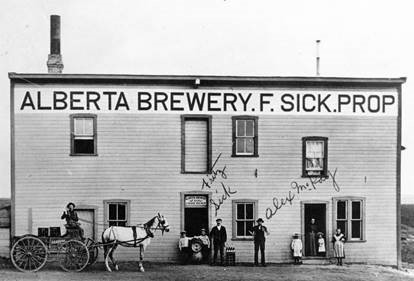The Molson Pilsner is a beer that many know and love.

But many probably don’t know its origin story.
“Over time, it really has become associated with Saskatchewan,” said Belinda Crowson, president of the Lethbridge Historical Society. “And so there’s a need to remind people that it has a longer history than that.”
Fritz Sick, grandfather of the Molson Pilsner, moved to Lethbridge in 1901. Originally from Germany, he had a long history of working in breweries.

So, he started one in the province. It was called Alberta Brewing and Malting Co. One of his well-known early beers was called Alberta’s Pride.
Crowson said that Lethbridge is actually a perfect spot for a brewery.

Over the next 15 years, Sick turned the brewery into a booming business. Crowson calls him one of Lethbridge’s early entrepreneurs.
That is until prohibition hit Alberta in 1916.
Hard times hit Sick and his business. But that didn’t stop him.
Sick expanded his business and bought more breweries. He changed the name to Associated Breweries of Canada Ltd. The breweries were all named “Sick’s” and identified by where they were located.
In 1926, two years after prohibition ended, Fritz launched what we would today call a successful marketing plan.
“He made this big fanfare,” said Crowson. “It was this beer that he had wanted to bring around for a very long time but he couldn’t introduce it until after prohibition was over.
“He said that the other breweries just didn’t care about their customers as much as he did, and they just didn’t have as much knowledge or experience.”
Enter, the Pilsner. The original label was designed by his daughter, Louise Sick. The top left has the “House of Lethbridge,” which identifies that the beer came from the Lethbridge brewery.

Across the label are different things Louise thought represented southern Alberta and the brewery.
“It represents a history of southern Alberta in many cases, but much of that you’d have to know Lethbridge history to understand,” said Crowson.
Sick’s son, Emil Sick, eventually took over the brewery business. He expanded further, even going to the United States. In 1944, Associated Breweries of Canada Ltd. changed its name to Sick’s Breweries Ltd.
In 1958, Sick management came to an end when Molson took control.
But the Pilsner legacy continued.
“The Molson Pilsner is the continuation,” said Crowson. “So once Molson took over, they took over the Pilsner as well.”
Molson ran the Lethbridge brewery until it was shut down in 1990. A year later, it was torn down, taking with it the history of a well-known beer.
“The brewery has been gone for 30 years. So there have been 30 years of people not recognizing a connection with that beer history. In that amount of time, a lot of people have come and gone from Lethbridge without knowing,” said Crowson.
But the impact that Sick’s brewery had in Lethbridge was huge. It started with just him and his family but eventually turned out to be one of the largest employers in Lethbridge.
“If you talk to anybody whose family is from around here, chances are that somebody has worked at the brewery back in the day,” said Crowson.
The building may be gone, but the beer lives on.








Comments